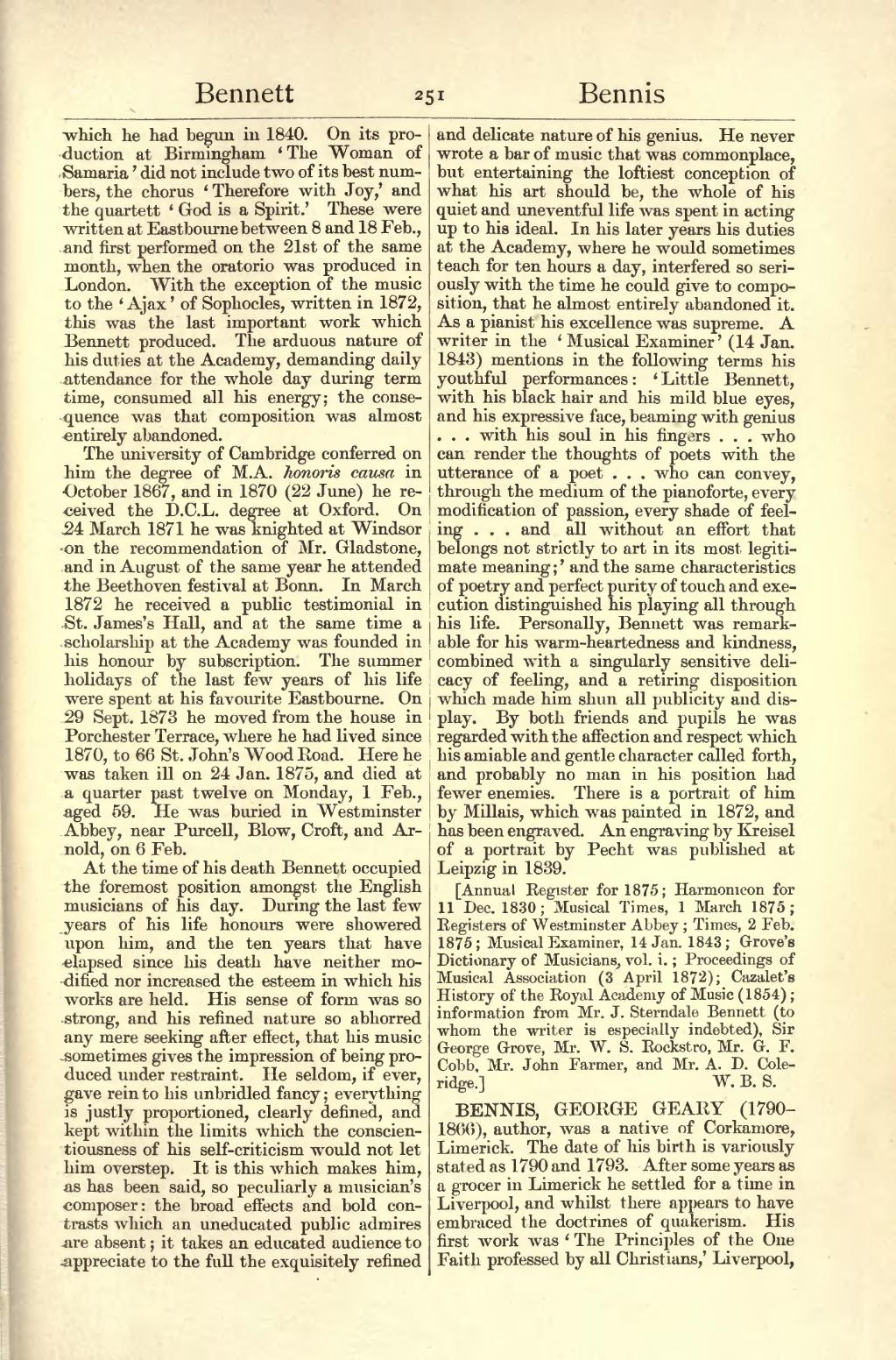which he had begun in 1840. On its production at Birmingham 'The Woman of Samaria' did not include two of its best numbers, the chorus 'Therefore with Joy,' and the quartett 'God is a Spirit.' These were written at Eastbourne between 8 and 18 Feb., and first performed on the 21st of the same month, when the oratorio was produced in London. With the exception of the music to the 'Ajax' of Sophocles, written in 1872, this was the last important work which Bennett produced. The arduous nature of his duties at the Academy, demanding daily attendance for the whole day during term time, consumed all his energy; the consequence was that composition was almost entirely abandoned.
The university of Cambridge conferred on him the degree of M.A. honoris causa in October 1867, and in 1870 (22 June) he received the D.C.L. degree at Oxford. On 24 March 1871 he was knighted at Windsor on the recommendation of Mr. Gladstone, and in August of the same year he attended the Beethoven festival at Bonn. In March 1872 he received a public testimonial in St. James's Hall, and at the same time a scholarship at the Academy was founded in his honour by subscription. The summer holidays of the last few years of his life were spent at his favourite Eastbourne. On 29 Sept. 1873 he moved from the house in Porchester Terrace, where he had lived since 1870, to 66 St. John's Wood Road. Here hewas taken ill on 24 Jan. 1875, and died at a quarter past twelve on Monday, 1 Feb., aged 59. He was buried in Westminster Abbey, near Purcell, Blow, Croft, and Arnold, on 6 Feb.
At the time of his death Bennett occupied the foremost position amount the English musicians of his day. During the last few years of his life honours were showered upon him, and the ten years that have elapsed since his death have neither modified nor increased the esteem in which his works are held. His sense of form was so strong, and his refined nature so abhorred any mere seeking after effect, that his music sometimes gives the impression of being produced under restraint. He seldom, if ever, gave rein to his unbridled fancy; everything is justly proportioned, clearly defined, and kept within the limits which the conscientiousness of his self-criticism would not let him overstep. It is this which makes him, as has been said, so peculiarly a musician's composer: the broad effects and bold contrasts which an uneducated public admires are absent; it takes an educated audience to appreciate to the full the exquisitely refined and delicate nature of his genius. He never wrote a bar of music that was commonplace, but entertaining the loftiest conception of what his art should be, the whole of his quiet and uneventful life was spent in acting up to his ideal. In his later years his duties at the Academy, where he would sometimes teach for ten hours a day, interfered so seriously with the time he could give to composition, that he almost entirely abandoned it. As a pianist his excellence was supreme. A writer in the 'Musical Examiner' (14 Jan. 1843) mentions in the following terms his youthful performances: 'Little Bennett, with his black hair and his mild blue eyes, and his expressive face, beaming with genius ... with his soul in his fingers ... who can render the thoughts of poets with the utterance of a poet ... who can convey, through the medium of the pianoforte, every modification of passion, every shade of feeling ... and all without an effort that belongs not strictly to art in its most legitimate meaning;' and the same characteristics of poetry and perfect purity of touch and execution distinguished his playing all through his life. Personally, Bennett was remarkable for his warm-heartedness and kindness, combined with a singularly sensitive delicacy of feeling, and a retiring disposition which made him shun all publicity and display. By both friends and pupils he was regarded with the affection and respect which his amiable and gentle character called forth, and probably no man in his position had fewer enemies. There is a portrait of him by Millais, which was painted in 1872, and has been engraved. An engraving by Kreisel of a portrait by Pecht was published at Leipzig in 1839.
[Annual Register for 1875; Harmonicon for 11 Dec. 1830; Musical Times, 1 March 1875; Registers of Westminster Abbey; Times, 2 Feb. 1875; Musical Examiner, 14 Jan. 1843; Grove's Dictionary of Musicians, vol. i.; Proceedings of Musical Association (3 April 1872); Cazalet's History of the Royal Academy of Music (1854); information from Mr. J. Sterndale Bennett (to whom the writer is especially indebted), Sir George Grove, Mr. W. S. Rockstro, Mr. G. F.Cobb, Mr. John Farmer, and Mr. A. D. Coleridge.]
BENNIS, GEORGE GEARY (1790–1866), author, was a native of Corkamore, Limerick. The date of his birth is variously stated as 1790 and 1793. After some years as a grocer in Limerick he settled for a time in Liverpool, and whilst there appears to have embraced the doctrines of quakerism. His first work was 'The Principles of the One Faith professed by all Christians,' Liverpool,
